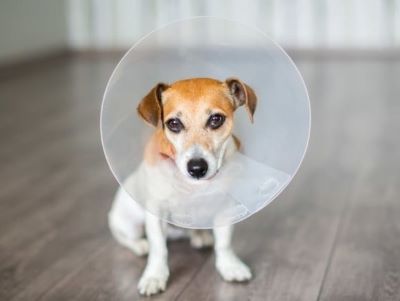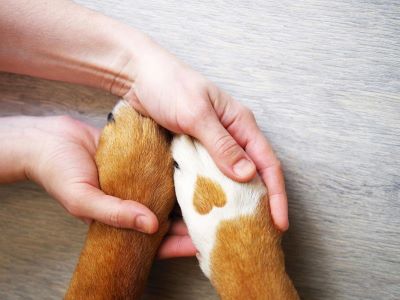Do you know more than half of the animals who are rescued by welfare organisations do not find a home? To do something about this situation at an individual level we must consider neutering our dogs, which can be expensive. And to answer, How much does it cost to neuter a dog in the UK?

Let’s explore the affecting factors. Understanding cost and other factors is vital in providing the best care for our furry friend. Let’s explore the average costs and other facilities needed to neuter a dog.
You Might Also Like:
What Is Neutering?
Neutering is a surgical procedure in which doctors remove testicles and make the dog infertile. helps to prevent some health issues and behavioural problems. Also, it reduces overpopulation. It requires anaesthesia and recovery after the procedure.
Neutering is crucial for controlling the pet population as it eliminates the possibility of unwanted litter, which can end up in shelters or on the streets.
According to the data from ASPCA, more than 6 million animals enter the shelter or rescue systems annually, and only half of them find a home.

Neutering can improve a pet’s health and prevent the risk of certain diseases like testicular cancer, infections, and hernia. It can also decrease hormone-related issues such as humping, aggression, roaming and marking[1].
How Much Does It Cost to Neuter a Dog in the UK?
On average, it costs around £200 to neuter a male dog and £300 to neuter a female dog. The cost usually covers anaesthesia, surgery, and post-surgery pain relief. And, the cost for female dogs is slightly higher as it is a more complicated process[2].
The cost of neutering a dog in the UK varies according to the breed, size, and gender of the dog. It also depends on the location of the vet’s clinic and his practice. Here are some factors that affect the cost:
Breed and Size
The requirement for anaesthesia, surgical time, and materials vary according to the breed and size of the dog. Generally, larger dogs tend to cost more than smaller dogs and more breeds may have some health risks which can make surgery more complex.
For example, Bulldogs and Pugs may have breathing difficulties during anaesthesia and giant breeds such as Great Danes and Mastiffs may have higher blood loss or longer recovery times[3].
Veterinary Clinic Location and Reputation
The Vet’s reputation and the location of the clinic may affect the cost too. Some regions have a higher cost of living and demand for services also leads to higher prices.
Additionally, some clinics and vets have more experience, they are better equipped to deal with complex procedures and cases, which influences the cost as well. You can compare different clinic reviews, ratings or credentials before making any decision.

Pre-operative Examinations and Tests
Before the surgery dog may need some examinations to ensure their condition before surgery takes place. This may include a physical exam, blood work, urine analysis, chest X-ray, ECG, or ultrasound.
These tests can detect any underlying conditions or complications that may affect the surgery, such as infections, anaemia, kidney, heart conditions, pregnancy, and liver problems.
Post-operative Care
After the surgery, the dog will need post-operative care as well. Medications that will help them to heal and prevent infections. Some clinics may include these charges beforehand and some may charge separately as needed.
This may include painkillers, antibiotics, anti-inflammatories, wound dressings, staple removal, follow-up visits, or a cone to prevent them from licking or biting the incision site.

Difference Between Spraying and Neutering?
Neutering and Spraying are done to prevent dogs from reproducing. Spaying a dog refers to the removal of a female dog’s reproductive organs, while neutering refers to the procedure that’s done for males.
“Spraying also ovariohysterectomy, is done in female dogs and involves the removal of the ovaries and uterus. This prevents heat cycles and eliminates the risk of certain reproductive health issues. Neutering also known as castration, is performed on male dogs which involves the removal of testicles”, says Dr Elfenbein from PetMD.
This eliminates their ability to become a father and reduces behaviours driven by mating instincts. Both these process helps to control the pet population, improve their health, and unwanted behavioural issues related to mating.

Potential Disadvantages of Neutering
While neutering has various advantages, there are also some potential risks involved. It is essential to take into consideration and discuss with the vet to make an informed decision about whether to neuter a dog or not. Discuss their breed, age, health, and lifestyle. Here are some more elements to think about:
- Behavioural Changes
- Weight Gain
- Orthopaedic Issues
- Urinary Tract Issues
- Hormonal Changes
- Anaesthetic Risks
- Irreversibility
How to Take Care of a Neutered Dog?
Taking care of a neutered dog is similar to caring for any other dog, but there are a few specific considerations to keep in mind post-surgery. Here are some essential tips for taking care of a neutered dog:

- Regular follow-ups
- Manage activity and exercise
- Don’t let them start walking or running soon
- Prevent licking the wound
- Monitor for signs of distress or complications
- Adjust diet to manage weight
- Maintain good hygiene
- Observe behaviour
- Provide mental stimulation
- Show love and affection
- Be patient
By following these care tips, you are providing your dog safe and healing environment. Remember every dog is unique and so are their needs, so always consult with the vet.
FAQs
What Is the Best Age to Get a Dog Neutered?
Most dogs are usually neutered between six months and two years of age. To completely rule out unwanted pregnancies, you can have your dog neutered before they’re sexually mature. The age a dog sexually and physically matures often depends on what breed they are.
Is It OK to Neuter a Dog at 1 Year of Age?
When should I neuter my male dog? Small dogs do not have as many orthopaedic issues, therefore it is OK to neuter them on the younger side at 6-12 months of age. For large dogs that are very prone to orthopaedic injury/diseases, we now recommend waiting to neuter until 9-18 months of age.
Do Male Dogs Change After Being Neutered?
According to several studies, the main behaviours that are affected consistently in male dogs following neutering (I guess I am being politically correct now) include decreased sexual behaviour (primarily, mounting behaviour), urine marking (depositing urine on objects), and roaming.
Do Female Dogs Get Cramps?
Since the female dog’s heat cycle bears symptoms comparable to a woman’s menstrual cycle in many ways, it is possible to conclude that during your dog’s heat cycle, she is uncomfortable and maybe even experiences cramping and mild amounts of pain.
Will Dogs Still Mate After Neutering?
You’re probably wondering, where’s the happy ending and the positive message? Well, for those of you who are afraid to neuter your pet because you’re sad he’ll never have a chance to mate, you can nix that excuse off your list. The take-home message here is that your neutered dog can still mate. If he wants.
Summary
In conclusion, Beyond number lies a vital emotional aspect, the love we have for our loyal companions, so neutering your dog is not only an act of compassion but also a significant step towards their health.
We must ask ourselves what kind of world we want for our beloved pets and their future generation. The answer lies not only in numbers but choices we make for our dogs, that will provide safe and happy life to our dogs!
Reference:
- Five good reasons why you should spay or neuter your pet– Brown University.
- Neutering a dog (castrating and spaying)- The Kennel Club.
- Mitze, S., Barrs, V. R., Beatty, J. A., Hobi, S., & Bęczkowski, P. M. (2022). Brachycephalic obstructive airway syndrome: much more than a surgical problem. Veterinary Quarterly– NIH






